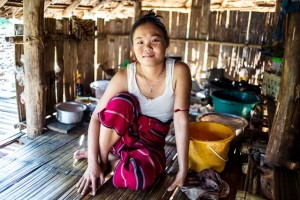Mu Mu, 28, stirs thin soup inside her small, two-roomed bamboo house on the Thai-Burma border, and speaks of the day the Burma Army soldiers came to her village a more than a decade ago.
 “The soldiers used us as [forced] porters. They would come to our village, Mae Ta Waw, and arrest men and women. They kept coming back and after three times of being forced to do this I fled to Thailand as a refugee.”
“The soldiers used us as [forced] porters. They would come to our village, Mae Ta Waw, and arrest men and women. They kept coming back and after three times of being forced to do this I fled to Thailand as a refugee.”
Mu Mu accused the Burma Army of shooting villagers
“They came to our village and demanded porters. When no one accepted, they shot [and killed] a pregnant woman trying to jump free of them. It was right in front of me.”
Mu Mu explains to Karen News why the soldiers had come to the village.
“The [village] men had left the village and fled to the jungle in fear of their lives. When the soldiers came to our village they asked us why here were no men and took the women as porters instead.”
Mu Mu looks out of a slit in her house that serves as a small window,
“I remember carrying their rations and crying.”
Mu Mu said life as a refugee in Thailand full of uncertainty and, with recent cuts to refugee rations and services, increasing difficulties.
“I have to help feed three old people, but it has been hard since the ration cuts. We have to go outside the camp during the day to do work to get enough money to survive. Before the ration cuts we didn’t have to go outside and work, but now we have no choice,” she says.
Mu Mu said that she has to take care of her sick parents.
“They face serious health problems. When my parents do not have enough to eat then I also need to work to feed them. But I am a woman, and it is hard to do the daily labor work…that is all that is available. Working cutting grass or on a farm, it’s very physical and difficult.”
Mu Mu feared the idea of returning to Burma.
“If they try and send me back to Burma, I would refuse. I hate the Burma Army. I cannot go back after seeing what they did to that woman and doing all the terrible things to us.”
Mu Mu fears the political situation in Burma is still too unstable for refugees to go back.
“The peace is unstable and uncertain, yes there are peace talks but we can’t yet say what the outcome will be. We have applied for resettlement to a third country… if we can we will leave. Now we just wait and work to survive. If you don’t work now, then you don’t have enough food.”
Budget Cuts ‘Puts Refugees Under Pressure’
In a previous interview with Karen News, Naw K’nyaw Paw, Secretary of the Karen Women’s Organisation, confirmed that refugees were being hit hard by the cuts and that it was common knowledge that they would have to go back, whether they wanted to or not.
“Our refugee community feels it is under pressure to return to Burma. If there is not enough food, not enough health services and not enough shelter [then] sensible people will feel the need to move and go to another place where they find these things. That is just common sense,” Naw K’nyaw Paw said.
The KWO is a community-based-organisation of Karen women working in providing relief services in the refugee camps on the Thai border and to internally displaced people inside Burma, it has a membership of more than 49,000 Karen women.
The Border Consortium (TBC), a coalition of international NGO’s, that has administered aid to the camps for over two decades, including food rations, has introduced a “staged assistance plan,” classifying refugees according to their level of need from self-reliant, standard, and vulnerable to most vulnerable. Adults considered as part of the ‘standard’ refugee population have faced the most of the cuts, while self-reliant refugees will no longer receive any ration.
According to TBC, the plan is about taking money away from rice and putting it into livelihood programs geared towards increasing the ‘self-sufficiency’ of refugees.
Naw K’nyaw Paw stated in a previous interview with Karen News said that the KWO continued to be overwhelmed with reports of refugees finding it difficult to cope with the ration cuts.
“We have received many reports from many women and men about the problems they are facing because of the cuts in rations and other service. If you cut an adult rice ration from 15 kilos per month to 8 kilos per month, [as] TBC has had to do in December 2013, you would expect to see problems emerging,” she said, adding, “The rations in the past were enough to keep people alive. Now they are not – assistance for bamboo and wood for our houses has also been drastically cut. As have support for health and education services. All of this throws a bigger burden onto families to provide for themselves.”



